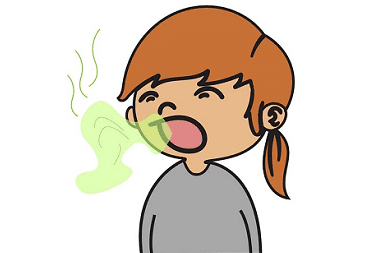Health for a lifetime >>>> Bad breath - causes and treatment
Bad breath - causes and treatment.

Man is a social being, which means that he tends to communicate with the people around him. But sometimes communication turns into agony if the other person frowns, turns away, or pulls away from you, catching bad breath from your mouth. How not to get "screwed up" and get rid of bad breath in time?
There is a popular belief that rinsing your mouth or chewing flavored gum and the smell will go away, but this is not the case. Aromatic substances only camouflage the smell, but do not remove it. Bad breath is caused by bacteria that support rotting processes, and the smell will not just disappear if the conditions are right for the bacteria to multiply.
Putrefactive processes can develop both in the centers of accumulation of undigested food residues, and in the tissues of the oral cavity themselves, in the depths of the gastrointestinal tract. Food residues stuck in the interdental spaces, in gum pockets, in cavities of decayed teeth, under dentures, decompose and emit an unpleasant odor. Fungal diseases of the oral cavity (in particular, Candidiasis) are also a source of unpleasant odor. Chronic inflammation in the throat is a source of bacterial infection that supports tissue erosion and thus creates the prerequisites for an unpleasant odor.
Disorders of enzymatic activity, dysbiosis, disturbances of intestinal motility contribute to the appearance of stale breath, as they provoke the processes of putrefaction in the intestines.
Treatment of bad breath is the identification and elimination of the causes that form it.
What to do to keep your breath fresh:
- brush your teeth effectively (after each meal, not before);
- brush the tongue from plaque with a toothbrush;
- in case of gum disease (bleeding, edema), rinse with herbal infusions of antiseptic or tanning action (chamomile, sage, St. John's wort, oak bark, calendula);
- when detecting violations of enzymatic activity in the gastrointestinal tract, correct enzymatic deficiency by taking drugs - enzymes;
- maintain the biobalance in the intestine by ingesting bacteria (lactobacilli, bifidobacteria);
- treat fungal diseases of the oral cavity (if any);
- treat chronic infections of the mouth and throat (staphylococci, streptococci) by rinsing with bacteriophages for the appropriate purpose;
- identify and treat in a timely manner intestinal dysfunction ( colitis, constipationand other disorders).

Read

Read



























